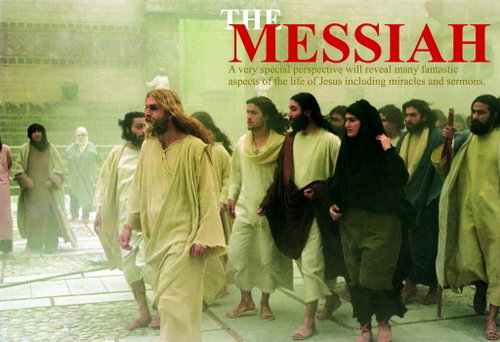Difference between revisions of "(+) Mesih (The Messiah / 2007 Talebzadeh), TV mini-series & feature film"
| Line 1: | Line 1: | ||
[ | [[File:Mesih Talebzadeh.jpg]] | ||
'''Mesih''' <Persian> / '''The Messiah''' [aka '''Jesus, the Spirit of God'''] (2007) is a film directed by [[Nadar Talebzadeh]]. | |||
==Abstract== | ==Abstract== | ||
The first movie to depict the life of Jesus from an Islamic perspective, as Muhammed's precursor and forteller who ascended to heaven before the crucifixion (with the traitor Judas taking his place). The narrative is based not only on the New Testament but also and primarily, on the Koran and Christian apocryphical literature (notably, the Gospel of Barnabas). As its Christian most recent counterpart, [[The Passion of the Christ (2004 Gibson), film]], the movie is a theological statement that totally disregards historical criticism. In its earnestly admiring view of Jesus, harmonizes as much as possible the Islamic and the Christian faith (to the point of providing two alternative endings about the crucifixion), while repeating some traditional anti-Jewish stereotypes. | The first movie to depict the life of Jesus from an Islamic perspective, as Muhammed's precursor and forteller who ascended to heaven before the crucifixion (with the traitor Judas taking his place). The narrative is based not only on the New Testament but also and primarily, on the Koran and Christian apocryphical literature (notably, the Gospel of Barnabas). As its Christian most recent counterpart, [[The Passion of the Christ (2004 Gibson), film]], the movie is a theological statement that totally disregards historical criticism. In its earnestly admiring view of Jesus, harmonizes as much as possible the Islamic and the Christian faith (to the point of providing two alternative endings about the crucifixion), while repeating some traditional anti-Jewish stereotypes. | ||
== | ==Production== | ||
Produced in Iran (2007). Starring Ahmad Soleimani Nia (Jesus). An expanded TV version in 20 episodes of 45m each was broadcast in Iran. | Produced in Iran (2007). Starring Ahmad Soleimani Nia (Jesus). An expanded TV version in 20 episodes of 45m each was broadcast in Iran. | ||
==External links== | ==External links== | ||
*[http://en.wikipedia.org/wiki/The_Messiah_(Iranian_film) Wikipedia] | *[http://en.wikipedia.org/wiki/The_Messiah_(Iranian_film) Wikipedia] | ||
*[http://www.imdb.com/title/tt1190075/ The Internet Movie Database] | *[http://www.imdb.com/title/tt1190075/ The Internet Movie Database] | ||
| Line 23: | Line 28: | ||
[[Category:Persian language|2007 Talebzadeh]] | [[Category:Persian language|2007 Talebzadeh]] | ||
[[Category:Made in the 2000s|*2007 Talebzadeh]] | [[Category:Made in the 2000s|*2007 Talebzadeh]] | ||
[[Category:Jesus of Nazareth (subject)|2007 Talebzadeh]] | [[Category:Jesus of Nazareth (subject)|2007 Talebzadeh]] | ||
| Line 28: | Line 34: | ||
[[Category:Jesus of Nazareth--cinema (subject)|2007 Talebzadeh]] | [[Category:Jesus of Nazareth--cinema (subject)|2007 Talebzadeh]] | ||
[[Category:Life of Jesus (subject)|2007 Talebzadeh]] | |||
[[Category:Muslim Jesus (subject)|2007 Talebzadeh]] | [[Category:Muslim Jesus (subject)|2007 Talebzadeh]] | ||
Revision as of 07:50, 12 August 2014
Mesih <Persian> / The Messiah [aka Jesus, the Spirit of God] (2007) is a film directed by Nadar Talebzadeh.
Abstract
The first movie to depict the life of Jesus from an Islamic perspective, as Muhammed's precursor and forteller who ascended to heaven before the crucifixion (with the traitor Judas taking his place). The narrative is based not only on the New Testament but also and primarily, on the Koran and Christian apocryphical literature (notably, the Gospel of Barnabas). As its Christian most recent counterpart, The Passion of the Christ (2004 Gibson), film, the movie is a theological statement that totally disregards historical criticism. In its earnestly admiring view of Jesus, harmonizes as much as possible the Islamic and the Christian faith (to the point of providing two alternative endings about the crucifixion), while repeating some traditional anti-Jewish stereotypes.
Production
Produced in Iran (2007). Starring Ahmad Soleimani Nia (Jesus). An expanded TV version in 20 episodes of 45m each was broadcast in Iran.
